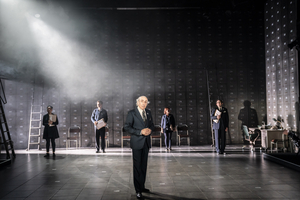Review: AFTER LIFE, National Theatre
Jack Thorne's play is a moving, fluid exploration of memory.

![]() The National Theatre kicks off its post-lockdown season with a brainteaser: what is the most meaningful or precious moment of your life? The question is central to After Life, Jack Thorne's stage adaptation of Hirokazu Kore-eda's acclaimed 1998 film, co-produced by Headlong, which unfolds in a purgatorial facility over the course of a single week.
The National Theatre kicks off its post-lockdown season with a brainteaser: what is the most meaningful or precious moment of your life? The question is central to After Life, Jack Thorne's stage adaptation of Hirokazu Kore-eda's acclaimed 1998 film, co-produced by Headlong, which unfolds in a purgatorial facility over the course of a single week.
Jeremy Herrin's stylish, poignant production takes us into a post-mortem world: here, six recently deceased people are required to choose a single memory from their lives which they will then experience forever. Bunny Christie's beautifully stark set envisions this environment as a bureaucratic hall dominated by mountainous filing cabinets, long ladders, and fluorescent lights. We are, it seems, far from a celestial realm with fluffy clouds and chirping angels.
The facility is run by a group of once-alive people called Guides, who are responsible for conducting sessions with their "clients" and helping them pick their special memory, before they "pass" to a different kind of existence. Like the dead who can spend only a week in this transitional space, the guides are deprived of their names, assigned numbers, and resigned to conduct themselves with down-to-earth practicality.
Kevin McMonagle's character oversees the operation with affable composure, delivering announcements to the residents while sipping tea. Millicent Wong plays an assistant who both resists some of the rules in her new job and appears keen to excel at it. Danielle Henry, as another guide, spends much of her stage time trying to persuade a young client (performed by Olatunji Ayofe with infectious energy) to stop questioning the process and get on with his task.
But if Thorne's play can be said to have a central character, that would be Charlie, a guide whose name we end up learning as he builds an unexpected relationship with his client, Hirokazu (Togo Igawaka). Luke Thallon is brilliant in this part, carefully portraying a slow-burn journey from earnest professionalism to disarming transparency.
The remainder of the strong ensemble animates this tender piece with great charm. June Watson is particularly gripping as the elderly Beatrice whose initial concern over her left-behind cat is gradually replaced by her vacillation between two resonant memories. Maddie Holliday's Jill is another who comes to doubt her initial choice after she learns that memories from Disneyland Paris are a popular choice among teenage girls.
Thorne's adaptation is admirable for its fluidity and relatively fast pace, with its cumulative impact relying a great deal on Tom Gibbons's shape-shifting sound design and Max Spielbichler's ambient video projections. Herrin's staging deftly blends the disparate elements of this otherwise difficult piece into a cogent, arresting whole. The transitions from one day to another are especially refreshing to behold.
Despite its overall lucidity, however, After Life can feel too episodic and tonally jerky. This is compounded by the fact that the stories of many of the characters remain stranded on the sidelines: there is a growing sense that these dead people are in an uneasy limbo not only between life and eternity, but also between depth and flatness.
Still, there is much to admire here. "We are not interested in absolute truth," declares Thallon's character at one point, "we are interested in memory." Herrin's production underlines the contrast between the two in a climactic scene where the chosen memories of the deceased are theatrically recreated with actors, costumes, and props. Cherry blossoms fall from the flies, an astronaut travels through space, and a ballroom comes alive with dancers. Indeed, this afterlife is nothing if not a grand stage - its residents at once spectators and players, with their exits and entrances.
In less than two hours, After Life smoothly transforms its grey library of cabinets into a vibrant kaleidoscope of memories. The result is not necessarily a profound meditation on all things life and death, but it is bound to strike a chord as a moving exploration of what qualifies as a moment worth living for - over and over again.
After Life at The National Theatre until 7 August
Photo credit: Johan Persson
Reader Reviews

Videos
